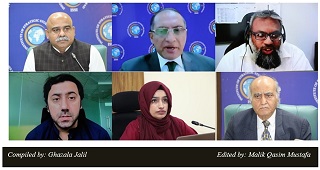The Arms Control & Disarmament Centre (ACDC) at the Institute of Strategic Studies Islamabad (ISSI) organised a webinar on “Big Data for National Security: A Case of Pakistan” on May 11, 2022. Speakers included Dr Muhammad Ali Ismail, Principle Investigator, National Center of Big Data & Cloud Computing (NCBC), Karachi, and Dr Hussain Nadim, Executive Director (C &R), Islamabad Policy Research Institute (IPRI) and Ms Aamna Rafiq, Research Associate ACDC-ISSI.
In his welcome remarks, Ambassador Aizaz Ahmad Chaudhry, Director-General ISSI said that big data refers to a collection of data that is enormous and comes at you with great speed and continues to grow. Big data needs to be managed and analysed for it to be useful. This data explosion is touching every aspect of life human security, finance, stock exchange, banking, social media and the agricultural sector. The government, private sector as well as individuals are keen to use big data to their benefit. Big data is also playing a big part in the technological race between the US and China. The statistics are mindboggling where China is manufacturing 250 million computers annually, 25 million automobiles and 1.5 billion smartphones. China continues to focus on producing world consumer goods. Thus, there is a huge technological race going on that will be powered and fuelled by big data. Pakistan needs to be aware of how it can help or undermine our national security.
Earlier in his introductory remarks, Malik Qasim Mustafa, Director ACDC, said that big data means a larger volume of a complex data set, which is received at a fast velocity rate and contains greater variety. According to experts, it can influence every aspect of individual human life and society and the global landscape. It enables everything from access to knowledge and global communication to the delivery of services and infrastructure. Big data analytics is positively transforming the ways of doing business, trade, governance, politics, communications and social services. However, its misuse can equally exacerbate existing national security threats and can create new and unpredictable ones.















